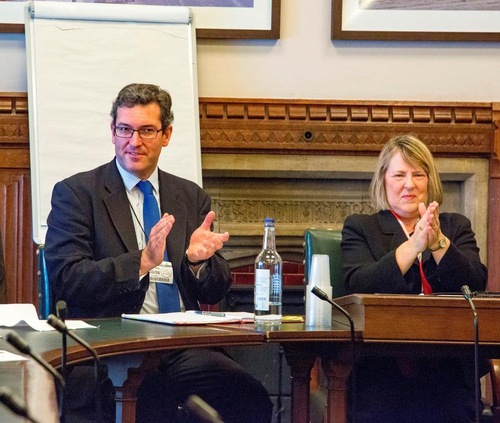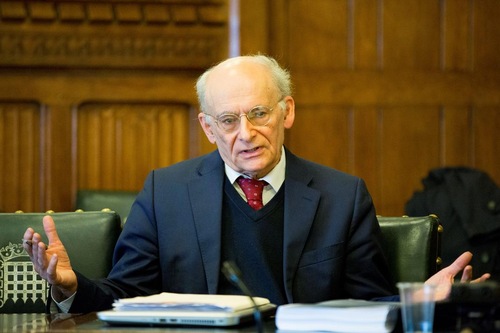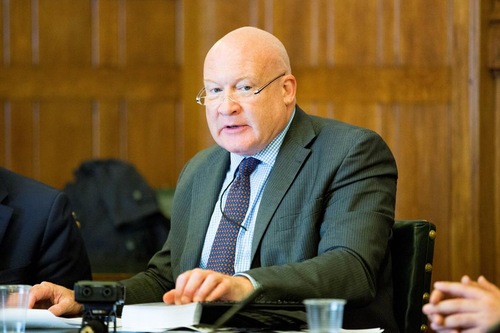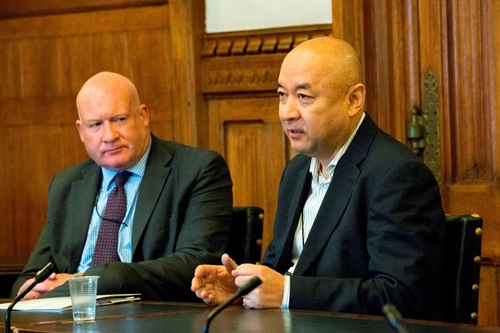Hearing on Forced Organ Harvesting in China Held in British Parliament
(Minghui.org) Two days after The Conservative Party Human Rights Commission launched a report on China's human rights situation, a hearing was held at the British Parliament on June 30, 2016 to highlight the killing of prisoners of conscience for their organs, especially Falun Gong practitioners.
With a title of “The Darkest Moment: The Crackdown on Human Rights in China 2013–2016,” the Commission report published on June 28 focuses on the “unprecedented crackdown” on human rights in the recent three years, and outlines 22 recommendations for the UK government.
Benedict Rogers, vice-chair of the Commission, and Fiona Bruce MP, chair of the Commission, led the hearing on June 30. Human rights lawyer David Matas, investigative journalist Ethan Gutmann, and former surgeon Enver Tohti spoke at the event.
 Benedict Rogers, vice-chair of the Commission, and Fiona Bruce MP, chair of the Commission, lead the hearing at the British Parliament.
Benedict Rogers, vice-chair of the Commission, and Fiona Bruce MP, chair of the Commission, lead the hearing at the British Parliament.
Matas: Large Number of Falun Gong Practitioners Are Killed for Organs
“Since David Kilgour and I published Bloody Harvest, the third version of our report in book form, and Ethan Gutmann published his book The Slaughter, we three have remained active in writing, researching, investigating, and speaking on organ transplant abuse in China,” said Matas.
After the U.S. House of Representatives unanimously passed H.Res.343, which condemns the harvesting of organs from prisoners of conscience in China, these three investigators released an update to their earlier books at the National Press Club on June 22. This new 680-page report (available for download at www.endorganpillaging.org) provides a comprehensive update to the investigation work by the three authors over the past decade. With more than 2,300 references, it includes a large volume of information collected from media reports, official statements, medical journals, and hospital websites.
 Matas said when they looked at hospitals and doctors one by one, a number of features jump out, and “one is the sheer volume of transplants.”
Matas said when they looked at hospitals and doctors one by one, a number of features jump out, and “one is the sheer volume of transplants.”
Matas observed that the organ harvesting in China occurs at a large scale, and operates so efficiently that the bottleneck of China's organ transplant industry is not the availability of organ sources, but rather facility and personnel constraints. In addition, many military hospitals were found to be involved in the atrocities.
Gutmann: A Familiar Specter of Human Genocide
Gutmann said many hospitals and doctors participated in the organ harvesting. For example, the authors estimate that Tianjin First Central Hospital performs more than 5,000 transplants per year, while the No. 309 Military Hospital in Beijing is likely performing more than 4,000 transplants per year. That is, about 10,000 transplants took place in these two hospitals alone.
“And that yields a back-of-the-envelope answer: not 10,000, but 50,000-60,000 transplants per year,” Mr. Gutmann added. “This is a familiar specter of human genocide—cloaked in modern scrubs.”
 Gutmann said the atrocity is not only an issue related to Falun Gong. Rather, it is a genocide that is occurring in contemporary society.
Gutmann said the atrocity is not only an issue related to Falun Gong. Rather, it is a genocide that is occurring in contemporary society.
Human Rights—An Ignored Topic in China
Enver Tohti, a former Uyghur doctor, testified that he was forced to remove organs from a death-row prisoner 18 years ago in Xinjiang, China. He said the prisoner had received a non-fatal gunshot to the chest, and that no anesthetic was used.
Dr. Tohti explains the act as a result of ideological control. “Whoever you are, if you have different opinions than the Chinese Communist Party, it will treat you as an enemy–no longer a human being, but rather property of the state [Party] that it can use at will.”
“It wasn't until I came to the United Kingdom that I gradually realized that I hadn't been educated on human rights in mainland China. Based on my ideology at the time, I even thought that being able to participate in doing away with an enemy of the state [Party] was a glorious thing,” he reflected.
 Enver Tohti (right), a former Uyghur doctor, talked about his painful experience 18 years ago.
Enver Tohti (right), a former Uyghur doctor, talked about his painful experience 18 years ago.
Human Rights Commission Urges Continued Efforts Against Organ Harvesting
Rogers urged more Parliament members to pay attention to the brutality. “Specifically on the issue of organ harvesting, one of our recommendations in the report is that there should be an international, independent inquiry to establish the truth of what is happening on organ harvesting,” including where the organs come from and the scale of transplants being performed.
Bruce agreed, “We recommend an international investigation into organ harvesting in China, and we ask the British government to take a lead on this.” In addition, he said the issue of organ harvesting should be addressed “not just privately, but publicly.”